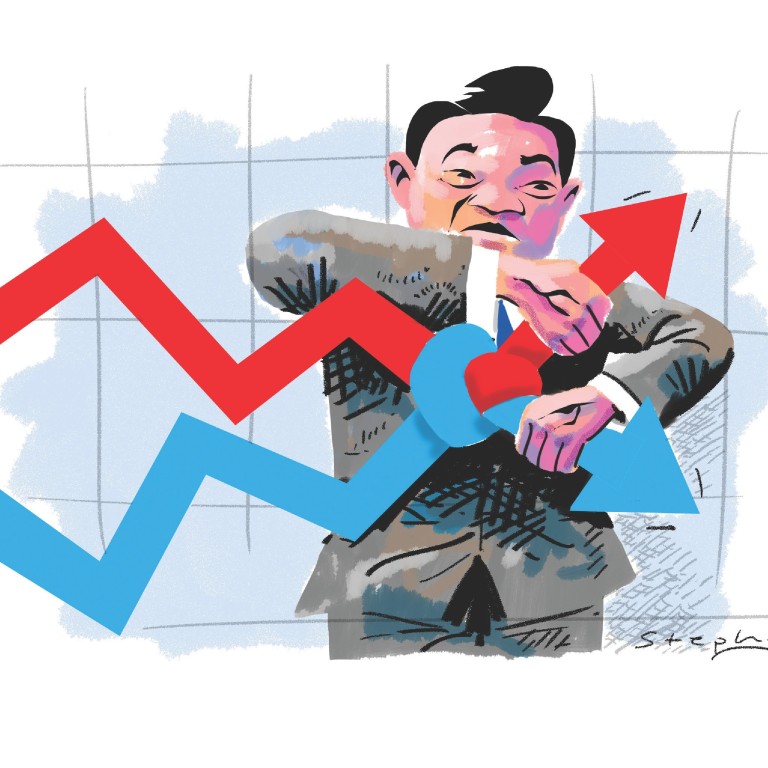
How Beijing will control soaring stocks
Stephen Wong says Beijing must continue the difficult job of balancing reform of the mainland stock market and implementing measures to control its rapid rise, which will lead to increased volatility in Hong Kong share prices
The Hong Kong stock market has garnered a lot of attention of late amid increased volatility and a huge rise in transaction volumes. Even the financial secretary commented on the market, saying in his blog that he was delighted to see the rebroadcasting of the TV drama during this volatile period.
There has been talk about whether the mainland government is behind the rise of the A-share market to create a wealth effect and support the slowing economy, and whether it has also been encouraging money flows into Hong Kong to facilitate a similar rise in the Hong Kong stock market.
Beijing clearly prefers the stock market to the property market as a store of wealth for its citizens, as money channelled into the stock market will, in theory at least, end up in companies for productive uses that will eventually benefit the overall economy.
This strategy also aligns with Beijing's goal of relying less on fixed capital investment and more on increased consumption for growth. This is done not just by creating the wealth effect from a rising stock market, but also by rising wages from more competitive companies with market-based financing.
Therefore, reforms have been carried out in the stock market to encourage more company listings and to make it easier to raise capital, as the market capitalisation to gross domestic product ratio is still relatively low in China.
The A-share market has been lagging behind overall GDP growth over the past 10 years, and the catching up of market valuations was reasonable, especially in the low-inflation environment with multiple rate reductions expected in the future. However, the A-share market has priced in a lot of the future reforms and other favorable environments and clearly has become relatively pricey.
At the same time, the improved version of the Shanghai-Hong Kong Stock Connect scheme, which allows individual and institutional investors in Shanghai to buy shares traded on the Hong Kong market and vice versa, will see more mainland investors (in the future) take advantage of the ever-increasing pricing gap between the A-share and H-share markets.
While the increased transaction volumes cannot be solely due to the funds going through the Shanghai-HK connect, the bias towards small market caps and volatile stocks in the Hong Kong market resembles the A-share market in some ways. It shows that mainland investors, or those using educated guesses about their preferences, have been a driving force behind the recent rise in the Hong Kong stock market.
The expectation, but not necessarily the reality, of more funds arriving from the mainland in the future is enough to explain the sharp rise in transaction volumes, as the spike in overall stock prices could accompany a rapid rise in volume, similar to what happened in 2007.
Back then, no actual funds were flowing from the mainland under the proposed stocks through-train scheme; the market rose simply on expectations of such a plan being implemented. Similarly, aside from a couple of days last week, the daily quotas of the Shanghai-Hong Kong connect to buy Hong Kong stocks have been underutilised by a big margin.
The rapid, astronomical rise in the A-share market (which is one of the key reasons for the rise in the Hong Kong stock market) demonstrates the dilemma the Chinese government has: on the one hand, it would like to create a more efficient stock market on the mainland for capital market activities. On the other hand, the lack of investment alternatives and the low market capitalisation to GDP ratio result in huge moves in market prices - marginal orders can move the market relatively easily.
Therefore, Beijing can be expected to continue to balance promoting the stock market and controlling its rise. Promotion of the stock market will rely on rapid reforms, including capital account reform (so citizens and investors on the mainland have investment alternatives in overseas markets), and an increase in transparency in raising capital.
Stock market controls will include administrative orders from time to time to tackle any excess leverage in the market, such as the recent announcement on margin lending controls.
Without these new measures, the A-share market would continue its rise, reaching an unsustainable level which would result in another stock market bubble burst. This would hinder the long-term development of the mainland financial market.
I expect the see-saw between reforms and control will continue in this A-share market cycle. As a result, we should expect more volatility in the Hong Kong stock market, which increasingly mirrors what happens in the A-share market.

